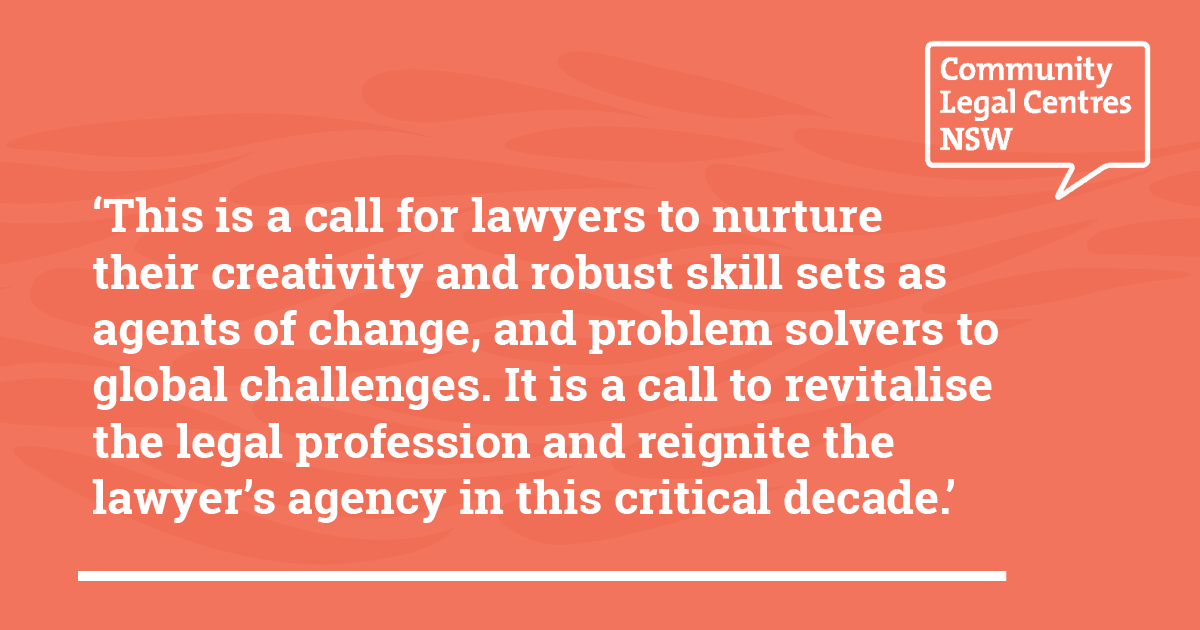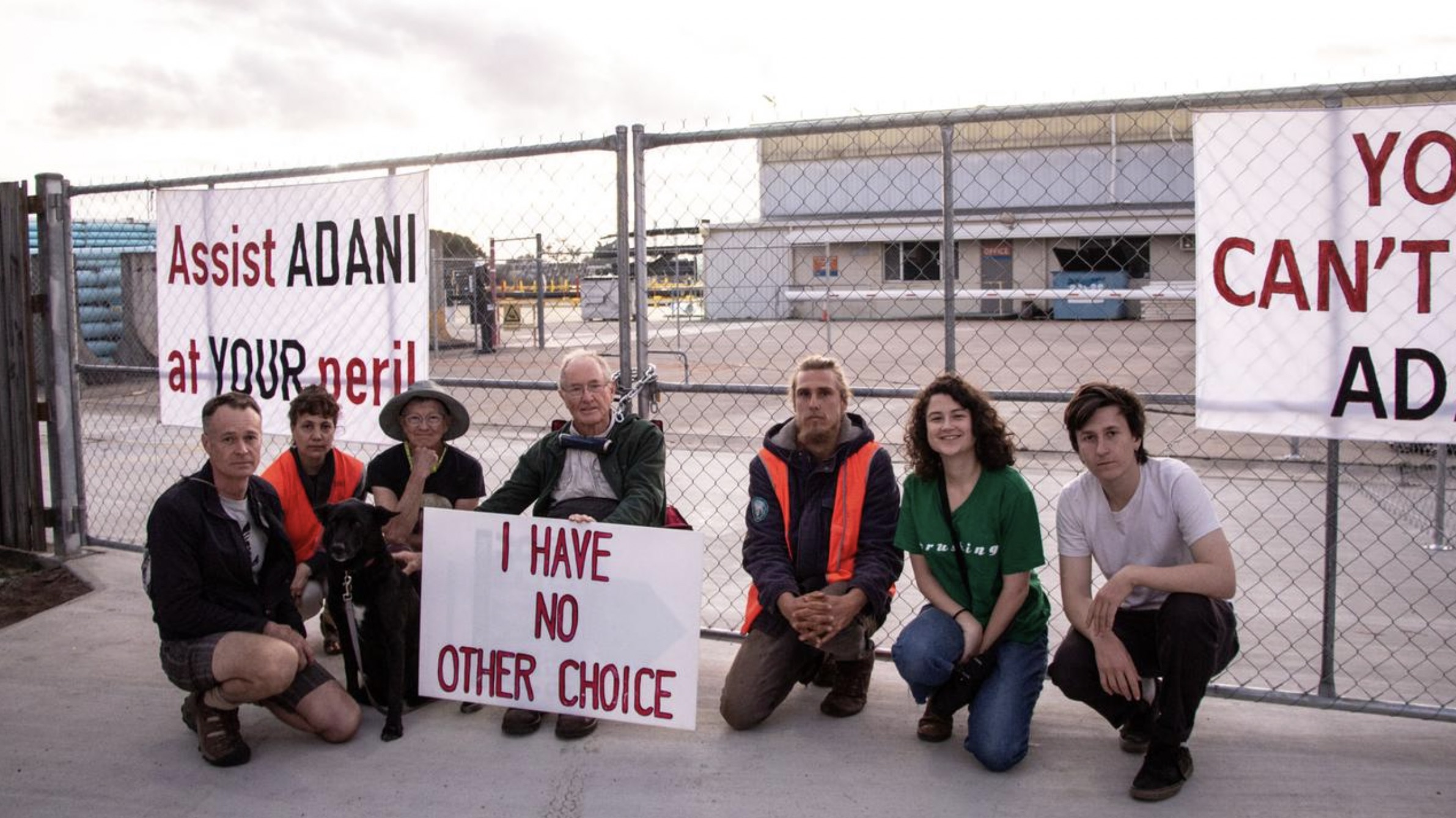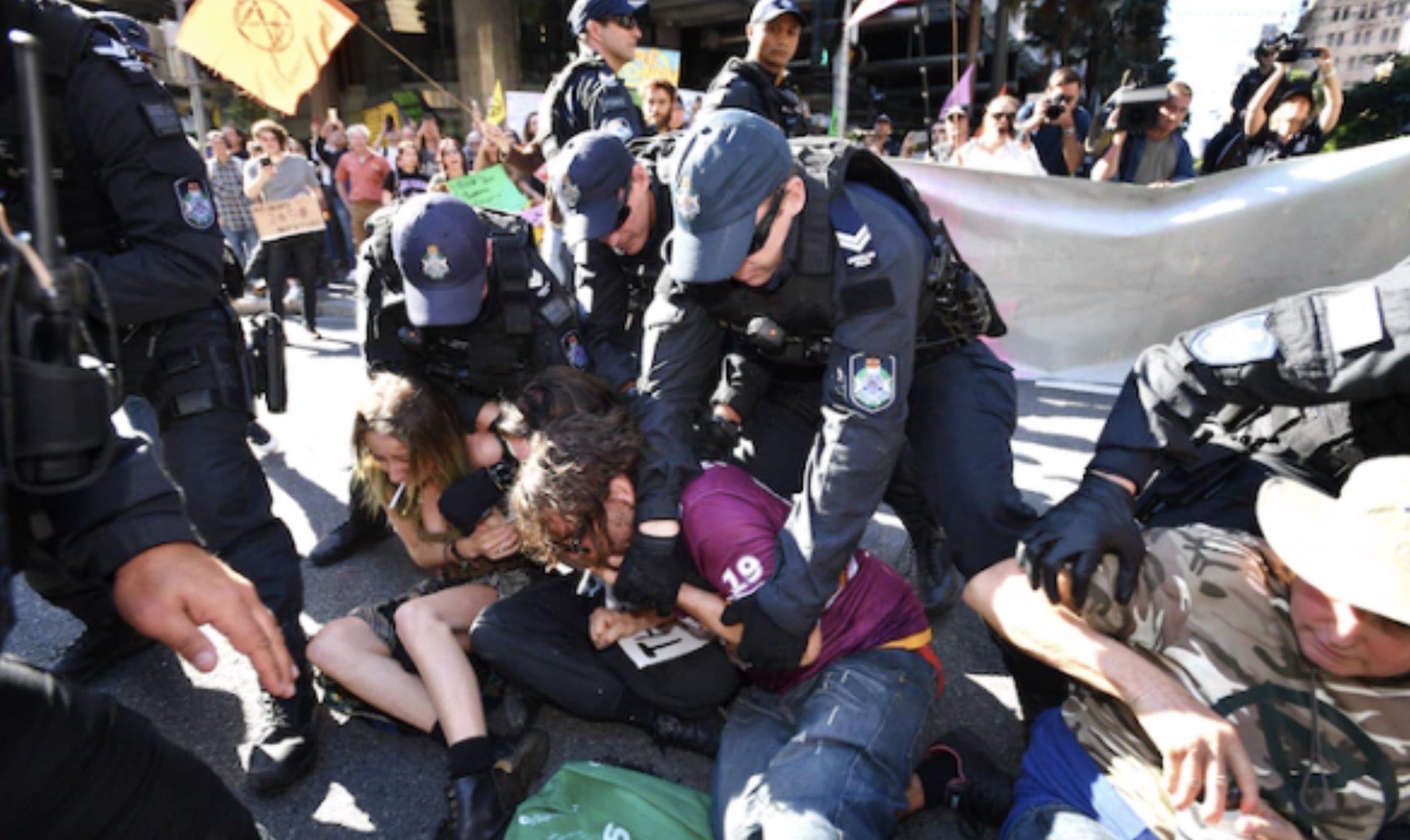Article by Anna Reynolds, Briana Collins, and Clare Scrine (Action Ready: Legal Resources for the Climate Movement).(1)

'The possibility of justice is diminished as lawyers pursue self-regulation in the service of power; it is enhanced when lawyers mobilise – in the political arena, workplace and law school – to contest it.” — Scott Cummings, The Paradox of Professionalism
Protest and community action have long been a part of community legal centre history and, indeed, without this form of advocacy, they would not exist. With the current climate crisis and the growing need for civil disobedience, the time for lawyers to build bridges with activists has never been more vital. Given its own foundations in protest, the community legal sector can make a valuable contribution.
Legal ethics in light of the climate crisis
There is a great debate in the legal profession as to whether the ‘good’ lawyer is an amoral service provider to the client or a guardian of the public interest. However, the mainstream legal ethic taught at law school is that, in our theoretically pluralistic and liberal society, ‘good’ lawyers are morally neutral instruments ready to play the tune of any member of society or cause in need of defence.
On paper, this sounds plausible, even idyllic. In a society where the status quo is comfortable and opportunity (more or less) equal for the majority, why shouldn’t lawyers keep their moral inclinations to themselves and profess a neutral servitude to the client’s interest?
But in practice, and in the world we find ourselves in today, the landscape is far from idyllic. In an era of climate change that threatens human annihilation, the status quo is revealing itself as catastrophically violent. Lawyer ‘neutrality’ in its traditional form is not achievable when ‘business as usual’ is leading us toward the extinction of life on earth. So, in the words of legal ethicist Christine Parker, ‘to rely on the rule of law (that is, to have blind confidence that the rules are fair and administered fairly) as an ethical guideline is naive, or worse, complicit’ in the perpetuation of gross climate injustice.(2)
So when faced with a need for system change like never before, what good is a lawyer?
Well, if mobilised effectively, enormous good actually. Lawyers have powerful voices. You are taken seriously in society and your opinions are deeply respected. We need you in our corner.
This is a call for lawyers to nurture their creativity and robust skill sets as agents of change, and problem solvers to global challenges. It is a call to revitalise the legal profession and reignite the lawyer’s agency in this critical decade.
The situation
Things are pretty grim right now. The planet is on fire, and that’s not a metaphor. Coal mines are being propped up before the safety of high school students and Indigenous leaders are being bankrupted while being made trespassers on their own land.(3) Global emissions continue to rise, and blame continues to be directed at individual consumption, rather than at the hundred odd companies who have led us here. At the same time, scientists have modeled just how many more people are going to die in 10, 20 and 30 years as a direct result of climate change in Australia.(4) You’ve heard it all before, and you’ll keep hearing it: climate change will have a devastating death toll, and is being made worse by governments propping up a dying fossil fuel industry.
However, in the last six months, discussions around the climate crisis have shifted. Yes, the impacts are accelerating quickly and the (most recent) “climate election” hasn’t saved us. But in the face of all this, ordinary people are waking up, and stepping up. Ordinary people are engaging, organising, rebelling, and rising like never before. Through massive general strikes, increasing public awareness, and protest – including civil-disobedience – we are seeing space for massive momentum forged within the climate movement.
And that’s where lawyers come in.
The more civil disobedience, the more need for behind-the-scenes assistance and the more need for lawyers. But, in terms of world views and mutual understanding, the gap between the legal sector and the activist community can be stark. Naturally, just the words “civil disobedience” can be enough to make some lawyers cringe. We don’t expect these tensions to be completely eradicated within any relationship between a lawyer and a ‘rebel’. But we do think there is potential for understanding to grow.
Civil disobedience: why to back it and not fear it
To explain why, it might be useful to unpack some of the complex rhetoric that surrounds civil disobedience and direct action.
Media and governments have long worked to establish a widely held belief that law equals morality, and that people who break the law deserve negative consequences for their actions.
By perpetuating and encouraging the belief that what is unlawful is automatically immoral, and that people who commit crimes are burdens on society, the government can control the narrative and quash mass mobilisation and civil disobedience. Demonising protestors establishes a social climate in which passing harsher laws becomes possible (or reform less possible).
But law doesn’t equal morality, and climate chaos is emblematic of this fact.
Our law has allowed the knowing decline of our planet to occur through grossly inadequate measures of accountability. Climate change is simultaneously not mentioned in our environmental legislation as an impact worth considering, while leading to our civilization’s demise. Billionaire fossil fuel companies receive slap-on-the-wrist fines (at best) for environmental catastrophes which destroy the homes and livelihoods of communities and animal species alike. Our laws are moulded according to the overbearing influence of the business and mining lobby, not a product of our society’s collective values and morals.
So why is breaking the law an answer?
Direct action, and particularly civil disobedience, uses the law, while also trying to disengage from the law. Most direct action seeks to disrupt the existing system and see individuals serving a kind of justice on destructive corporations who are untouched by existing laws. Activists do this knowing that living in a democracy comes not only with rights, but with obligations; the most fundamental obligation being to uphold democracy itself in any way that you can. As Howard Zinn famously said, ‘protest beyond the law is not a departure from democracy; it is absolutely essential to it’.(5)
History is filled with examples of the effectiveness of non-violent direct action, especially peaceful disruptions. A number of the rights we enjoy in Australia today were won using civil disobedience: like the vote for women and marriage equality. In fact, without protest and community action, many community legal centres wouldn’t exist. Within the environment movement, most major wins have been thanks to direct action and civil disobedience. Some local examples include the iconic campaigns to stop the damming of the Franklin River in Tasmania, the battle to stop uranium mining at Jabiluka in Kakadu National Park, and the Bentley Blockade against unconventional gas exploration in NSW’s Northern Rivers.

Photo: John Sheridan from Galilee Blockade locking onto the grounds of Townsville company, Iplex, that is considering contracting with the Adani Group. People of all ages and backgrounds are getting involved in civil disobedience campaigns to stop fossil fuel projects like Adani’s Carmichael Mine from going ahead.
While it’s all well and good to say that protests should have permits and refrain from interference with business or everyday people’s lives, the reality is that asking nicely hasn’t worked thus far. It’s not as if activists chaining themselves to coal rail lines or shutting down the Brisbane CBD week after week just haven’t considered other forms of changemaking, like writing to their local MP, or attending a permitted rally. Most of these more ‘radical’ activists have spent great amounts of time and energy pursuing change through ‘publicly-acceptable’ means. The inefficacy of these methods is often exactly what leads them (sometimes reluctantly) to direct action. If you’re chained to a railway line, this likely isn’t your first attempt at making the government pay attention to you.
Case study: A $61,000 restitution order for civil disobedience
As an example, a local activist we know well, Al Wicks, worked in conservation before they realised that environmental regulation was doing nothing to prevent our society’s reckless hurtle towards destruction. Al’s motivation for getting involved in civil disobedience resembles that of most activists: “I see deliberately breaking the law as a way of saying that I can’t accept the rules that we’ve built for a so-called peaceful and civil society, when it is far from that.”
Meanwhile, activists like Al are experiencing a crackdown on their abilities to take nonviolent direct action against the government’s inaction on climate change. Al was recently served with an eye-watering $61 000 restitution order for peacefully obstructing a coal train in the Brisbane area, an order which is a significant departure from the usual fine or community service penalty that protestors typically see for these sorts of actions. For Al, 'this just reinforced to me that we need to contest these laws which allow corporations to go about their business while legally driving us towards the brink of ecological collapse'. The severity of Al’s court order, of course, stands out in stark comparison to the relatively meagre fines which fossil fuel companies incur for breaching their commitments to (already minimal) environmental regulation.
New laws threaten civil disobedience rights in Queensland
Here, in Queensland, the state government has recently tabled a Bill designed to intimidate and harass peaceful protestors. It aims to extend police search powers with respect to traditional, peaceful protesting “lock on” devices and introduces new offences with maximum penalties of two years imprisonment for activists participating in lock-on actions aimed at disrupting business as usual. This is a terrifying and misguided overreach designed to dehumanise and deliberately target climate justice activists, rather than actually consider their reasonable policy demands.

Photo: Activists are experiencing a crackdown by governments tightening laws and penalties around people involved in protests.
Critiques of protest such as what we’ve seen recently in Queensland, use hyperbolic, alarmist language (“eco-terrorist”, “dangerous”, “extremist”). They choose easy marks, showcasing single instances of emergency vehicles being diverted, as though this is not a daily occurrence in a city with choked road infrastructure and an abysmal public transport system. Political attacks like those we’re seeing on peaceful protest at the state and federal level across the country, aren’t about ambulances. They’re designed to isolate and vilify protestors so their messages can be ignored. They’re designed to distract the populace from what’s really going on.
Moreover, if these laws go ahead in Queensland, this will set a dangerous precedent for the rest of Australia.
In short, participation in civil disobedience is growing in our local areas as more and more people awaken to the sheer and terrifying urgency of the climate crisis. At the same time, and as is the natural course, governments are doing all they can to straight-jacket the capacity of activists and quash attempts at resistance by tightening related laws and penalties.
How can community lawyers help?
There is a lot of ground to cover concerning the gaps in legal support for climate activists taking any and all kinds of actions – not just the “arrestable” ones.
1. Legal knowledge and information
A lot of the issues centre around knowledge. When it comes to ‘arrestable’ actions, organisers and participants must understand and know the law. It is standard for those involved in campaigns to receive legal briefings to maximise their ability to take informed risks. However, in the lead up to mass events, this is not always possible. This raises the issue of consent. Can masses of people consent to undertaking an arrestable action if they’re not informed of the risks and able to decide which ones they’re comfortable to accept?
These are some of the issues which prompted us to launch our website, Action Ready, with legal information specific to civil disobedience tactics within the climate movement. We thought it would be something that we just put out into the world, maybe updated every so often. But its launch only highlighted to us more gaps in knowledge and came just as both major parties have increased proposals for anti-protest legislation. So, we’re looking at providing more and more information, campaigning, and building connections between activists and lawyers.
2. Advocacy
Specifically, from lawyers, we need two things: pro-bono representation for activists and, where possible, your voices.
We understand that these approaches raise interesting ethical issues around balancing lawyer’s duties to clients and the court. When it comes to clients, activism asks you to change the way you think when giving advice to or representing activists who want to take a novel approach. It’s important to understand that like anyone who comes to a community legal centre, or any lawyer, activists are at a point of desperation. The motivations may be different and the outcomes sought may be different because their focus is on a collective goal and not harm minimisation, but they are acting out of desperation and a lack of alternative avenues. Here, the duty to act on instructions presents a very real opportunity for lawyers to be amplifying activists’ legitimate arguments and concerns.
When it comes to the fundamental duty to the court, there is no doubt that this needs to be upheld with utmost respect. But Mabo was not won by staying in the box.
The legal system and the courts have played many historical roles in becoming forums for change where the legislative and executive arms of government have fallen behind the needs of the society they claim to represent. Already, in efforts to flip and subvert the system, we’ve seen Indigenous activists pleading 'no jurisdiction' and an increase in the number of climate protestors pleading 'not guilty' on grounds of 'extraordinary emergency'. Climate groups around the world have taken companies and their government to courts, suing them for inaction on climate change. Another trend has seen activists refusing to sign bail in a continuation of disruption tactics, recognising that the action doesn’t have to stop on arrest. Sure, a tactic like this makes our legally trained minds shudder at the prospect of placing further strain on court resources, but the absolute urgency of the climate crisis and complete lack of action by governments at all levels demands that we try everything.
Activists have creative, expansive minds and many of them represent relatively privileged and comfortable sectors of the population. This makes them glowing candidates for a partnership in trying new things and testing the limits of the law.
How can you help us?
Alongside environmental impacts on unfathomable scales, climate change is absolutely a human rights crisis. We’re not talking about the future anymore, and unfortunately, we’re not only talking about prevention either; we’re talking about now, we’re talking about mass breaches of human rights, and we’re talking about coping.
Where we are threatened with mass extinction, including of the human race, lawyers have no claim to “moral neutrality” in its traditional form. The climate crisis will impact those who already experience disadvantage, vulnerability and state-sanctioned violence first and hardest. And that means that as lawyers, especially as community lawyers and human rights lawyers, the climate crisis falls under pretty much all of your ambits of work.
If you want to help us fight for a liveable world, that is also a fairer, more equitable one, here are a few specific ways you can help:
- If you are (or know) a criminal lawyer willing to (on occasion) provide pro bono help for activists, please email us: actionready@protonmail.com. We are mostly looking for support in Queensland, but can link you up with activists or similar organisations across the country.
- Donate some of your wage. Set up a regular donation to a climate justice organisation, preferably one that’s led by First Nations people. We’ve compiled a list here. Beyond regular donations, consider 'wage sharing' with someone who is giving up paid work to fight for climate justice by donating part of your wage directly to them. Most of our movement is working for free so this is a really simple and important way you can help keep it going. You can reach out to us if you’re interested in being linked up with an activist in this way.
- Organise in your community. Join a group, go to meetings, take on jobs, don’t let yourself become apathetic. Join the new Lawyers for Climate Action Australia group on Facebook. If you can’t find a group that resonates, start your own. Organise events, fundraisers, rallies, actions. Make activism a priority.
- Use your voice and your privilege to speak out. Talk about climate justice in your workplace, talk about it every single day. Speak to your friends, your family, to your kids’ P&C. Wherever you can, be a voice on this issue in general society, in politics and where possible, in law reform and in the courtroom.



